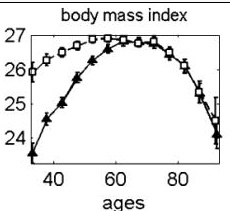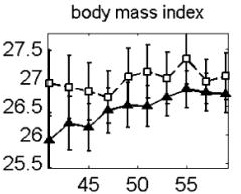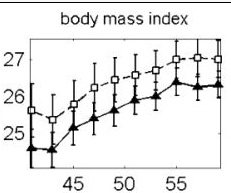I thought this was a nice review. The full text is available.
Nucleus. 2014 Jan-Feb;5(1):56-65.
Introduction[...] However, contrary to the well-documented positive effects of caloric restriction, several studies reported caloric restriction to be neutral or even detrimental to lifespan. For example, studies have found that caloric restriction regimens fail to impact lifespan in rhesus monkeys,7 wild mice,8 medflies,9 an isolate of the nematode C. Remanai,10 the spider L. Hasselti,11 and some yeast strains.12,13 Even more striking, CR actually shortened lifespan in several models including houseflies,14 male butterflies,15 the rotifer Cephalodella sp.,16 ILSXISS mice strains,17,18 and some yeast strains (Table 1).13 The work done with ILSXISS mice is particularly poignant. A meta-analysis of all mice studies excluding the ILSXISS strains reveals an average CR-dependent increase in lifespan of 15%.19 When the ILSXISS strains are included in the meta-analysis the average increase in lifespan drops to 2.9%.19 The ILSXISS studies set CR at 60% of AL intake in agreement with common standards in the field but it remains possible that more or less substantial restrictions may promote the lifespan of both ILSXISS and other mice strains. Taken together, these studies indicate that standard caloric restriction regimens do not universally promote longevity in various organisms. In other words, several more variables may exist within the equation determining the impact of CR on lifespan than originally anticipated. [...]Reduction of Body Weight under CR Can Positively or Negatively Affect Lifespan[...] As they start following CR regimens, obese individuals typically increase their lifespan as they lose fat mass. Simply put, this is because obesity is correlated with a number of age-associated pathologies such as cardiovascular disease and diabetes.29,30 Consistent with this rationale, in obese human males, CR reduces body fat while also significantly decreasing obesity-related pathologies such as high blood pressure and chronic inflammation.31 In addition, in obese mice, the combination of CR and omega-3-polyunsaturated fatty acid intake simultaneously counteracts adiposity and chronic inflammation.32 Thus, within obesity settings, CR-mediated weight loss is generally beneficial.In contrast, fat loss under CR is linked to lifespan shortening in the non-obese. For example, in non-obese mice, CR-induced fat loss is inversely correlated with lifespan.33 In addition, age-associated pathologies such as respiratory disease correlated with body weight loss in non-obese humans although CR can lower biomarkers for cardiovascular disease in this segment of the population.34-36 Although losing body weight appears to lower lifespan in non-obese humans aged 50–70 even when health status is considered, it is unclear if this applies to other age cohorts.34-36 Together, these studies and rationales suggest that the starting weight of an individual may dictate whether CR-induced fat loss positively or negatively impacts lifespan. [...]Nutrient Balance Affects the Response to CR[...] Studies conducted in both flies and mice lend support to this notion. The fruit fly D. melanogaster can be subjected to a yeast-based or sugar-based diet. Decreased intake of yeast or sugar increases lifespan.39 Interestingly, the positive effect on lifespan per calorie decreased was much more substantial under the yeast-based diet relative to the sugar-based counterpart.39 This suggests that it is not simply the decreased caloric content per se that solely impacts lifespan. One possibility is that restriction of yeast-based diets also limits the amount of other nutrients within this diet. Consistent with this reasoning, methionine restriction significantly increases murine lifespan independently of caloric content.40,41 It is conceivable that the restriction of several amino-acids or nutrients would have similar effects. Therefore, in addition to altering overall caloric intake, certain CR diets may also extend lifespan via restriction of various lifespan-limiting dietary components or nutrients.Specific nutritional composition may also explain contradictory results on the impact of different CR diets on lifespan. For example, one of many possible explanations for these apparently contradictory results on the effect of CR on rhesus monkey lifespan may be the dietary composition; the study in which the monkeys responded to CR had AL diets with higher sucrose and lower antioxidants and omega 3 polyunsaturated acids.7,42 Not surprisingly, these data imply that different nutrients may promote or limit lifespan. Thus, different CR regimens with multiple variations in overall nutrient balance are very likely to trigger a wide range of responses with respect to lifespan. For example, a CR regimen that restricts methionine while maintaining antioxidants might extend lifespan while a regimen that limits omega-3-polyunsaturated acids while maintaining sucrose may shorten lifespan. [...]


















































